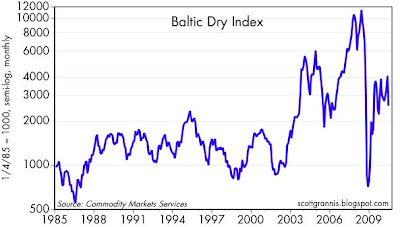Wednesday, June 23, 2010
Shipping update--looking better and better
The Harpex index of container shipping rates in the N. Atlantic has almost doubled so far this year, after having plumbed unimaginable lows. That's a V-shaped recovery in my book, even though rates have yet to regain their pre-crisis levels, and at the very least it severely weakens the bear case for European growth.
Update: At the request of a reader, here is a chart of the Baltic Dry Index, which measures shipping costs for bulk commodities in the Pacific. The index is enormously volatile, and has dropped 40% in past month. But as the chart shows, it is still up significantly from its end-2008 lows. As recently as 2001, today's levels would have been considered almost impossibly high. I think today's reading is consistent with an ongoing global economic recovery.
Subscribe to:
Post Comments (Atom)







5 comments:
Scott, would be a good time for your perspective on the Baltic Dry Index....seems like it has been in free fall
Scott,
Your May 20th post was titled "M2 Myth" in which you looked at the 2-year annualized growth rate for M2 which stood at about 5%. What do read, if anything, into monthly M2 growth of only 2%? Also, private sources now peg annual M3 growth at minus 6%. Do you feel that this might be a signal of moderating growth?
Greg: The BDI is down a bit of late but looking at the longer term it has risen to the levels of 2006, hardly a time of economic disruption.
See: http://noir.bloomberg.com/apps/cbuilder?ticker1=BDIY%3AIND
I've added a chart of the Baltic and some comments to the post.
rwburcik: M2 growth appears to be picking up a bit of late. The 3-mo. annualized growth rate is up from -1.4% to 3.3% in the past seven weeks. The 2-yr growth rate is now up to 5.4%. I think this strongly detracts from arguments that sluggish money growth poses a threat to the economy. It is still consistent, moreover, with my view that modest M2 growth, when added to rising M2 velocity (i.e., declining money demand) will fuel an ongoing recovery in nominal GDP.
Post a Comment